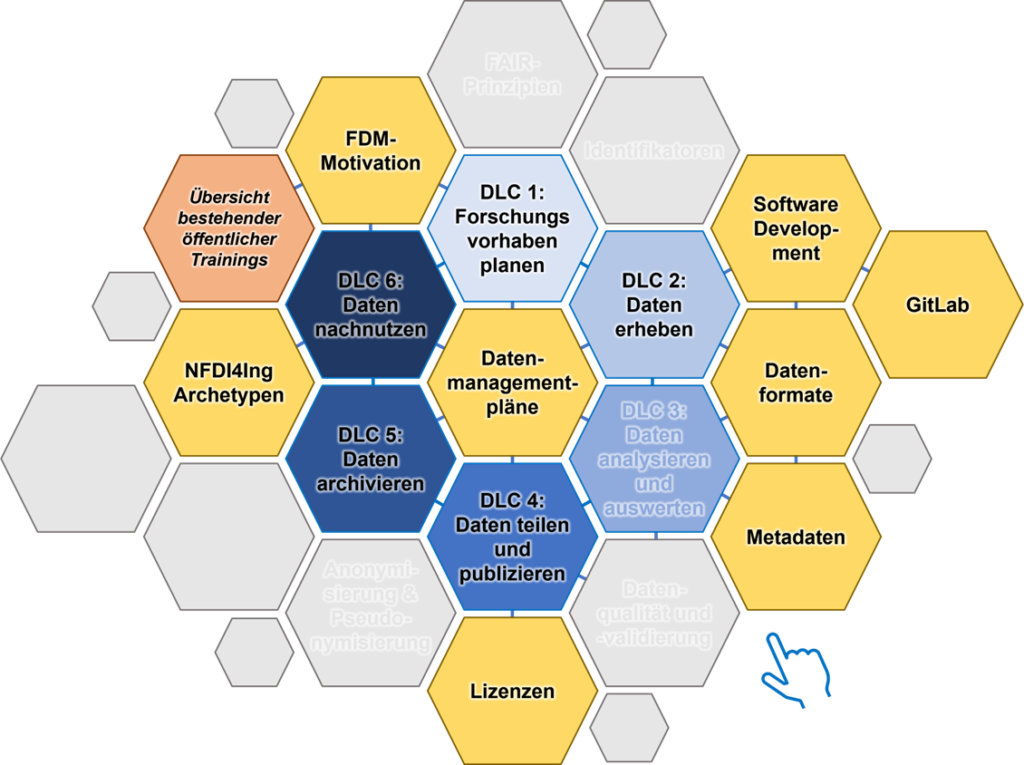Providing Research Data Management (RDM) support and education is a central goal of NFDI4Ing. That is why we are developing a learning platform for RDM with a special focus on engineering sciences. The challenge is to design it subject-specific and attractive for motivated, self-paced learning. To meet this requirement, we need your input!

In the process of creating learning materials, the team used the following methodical approach: First, existing (generic) RDM trainings have been identified. These are presented in an overview list and are reused – according to the respective license – as the foundation for the preparation of engineering-specific trainings. Next to the training contents itself, various training formats (like self-paced trainings, workshops, train-the-trainer etc.) and target groups have been identified and defined. This has been the starting point for creating and publishing first (engineering-specific) self-paced RDM trainings in NFDI4Ing’s Education Repository. The education repository allows for discussion and feedback on the training modules (i.e. PDF-slides), but it does not provide a good basis for motivated, self-paced learning. Therefore, the training materials in the Education Repository are transferred into webpages (gitlab pages) for better ease of use. This process is closely accompanied by the NFDI4Ing Special Interest Group (SIG) “RDM Training and Education”.
Within the monthly SIG meetings, a specific topic or training module is chosen and the respective existing training is presented. Based on this, participants are asked for feedback and suggestions. This aims to develop RDM trainings tailored to the needs of the engineering science community and to enrich (previously rather generic) trainings with an engineering perspective. In terms of the engineering-specific orientation, the community is asked for examples or anecdotes to illustrate the content practically. Even if it is not expected that such examples are applicable to everyone in the heterogeneous engineering community, they represent the community’s individual needs and are useful to personally identify with the topics. Integrating negative examples – sometimes referred to as “data horror stories” – into the trainings is a way to share experiences and to highlight potential consequences when (not) following the recommended training contents. Representation formats for all these examples can range from short texts to audio statements, animations, or videos integrated into the web-based trainings.
Beyond this, a special focus is currently on adding interactive elements to the trainings. Quizzes, assignment tasks and check questions are also used as diversified learning control and to reinforce the taught contents. Technically these are H5P elements, a format for various interactive elements, which can be exported for websites. Learning objectives are defined for each module. The learning objective matrix on topics of RDM for the target groups students, PhDs, and data stewards is used as reference and for quality control.
We are always looking for more members of the engineering community to get involved in enriching and further developing existing trainings. Everyone is invited to contribute to the existing and new training materials. We meet once a month to design one training topic. No matter whether you add short RDM anecdotes, share your experiences, supply interactive content (e.g. multimedia or animations) or help developing elements to check the learning progress (e.g. quizzes and tests) – every idea is welcome to make the trainings more interactive and more specific for engineers.
We believe that this is the best way to improve the effectiveness of the trainings and to help everyone getting a better and more practical start in RDM. Your participation is what makes our trainings community-driven!
The next meeting of the SIG “RDM Training and Education” will be on February 2nd, 2024, from 10AM to 12AM. If you are interested, feel free to subscribe to our mailing list to stay informed. We are looking forward to seeing you!
Marcos Galdino
Canan Hastik
Christian Langenbach
Mario Moser
Janna Neumann
Ute Trautwein-Bruns
Kerstin Wedlich-Zachodin
